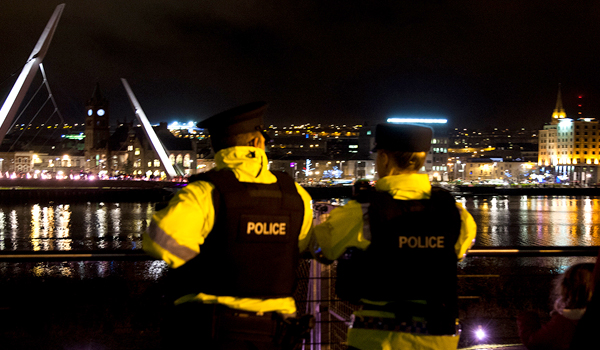NI post-Brexit security concerns allayed by EU deal, say MPs
A new report by the Northern Ireland Affairs Committee says the UK/EU Trade and Cooperation Agreement (TCA) has answered “core concerns” on cross-border security and policing.
The committee was worried that post-Brexit changes in security relationships would result in “inadequate” extradition processes and intelligence blind spots for police in Northern Ireland.
However, it said new extradition processes align closely with the European Arrest Warrant and keep decisions “firmly within the control of the courts rather than through political channels”.
Committee chair Simon Hoare MP said: “Following careful scrutiny of the TCA we found that it answered our core concerns on extradition and data sharing. It does this with no demonstrable negative impact on policing between the UK and Ireland.
“There had been fears that extradition processes could have created new opportunities for criminals, with intelligence sharing gaps appearing due to inadequate processes. We’re now confident that policing and justice will continue to be delivered quickly and effectively. Importantly, extradition decisions will remain in the hands of judicial authorities.”
The report, published on Wednesday (April 28), comes after the committee felt it was “prudent” to hold an inquiry focusing on concerns that security cooperation on a no-deal basis would lead to UK and EU law enforcement agencies falling back on outdated and sluggish conventions and processes.
It said the inquiry “put to rest” concerns over cross-border security and policing in Northern Ireland.
MPs found that the TCA, which concluded in December 2020, “mitigated concerns about extradition processes and intelligence blind spots”. They said it also laid the foundation for UK and Irish law enforcement bodies to build on already well-developed systems of cooperation.
The report said that the new extradition procedures would “avoid the significant delays” that authorities would have faced if they had to rely on the 1957 European Convention on Extradition, and keeps decisions firmly within the control of the courts rather than through political channels.
The UK’s data adequacy status is expected to be confirmed by the EU shortly. The committee says retaining this status will be key to efficient data sharing across the island of Ireland and with the rest of the EU. It is also calling on the UK Government to set out how it plans to support the future development of bilateral processes for information exchange between UK and Irish law enforcement agencies.
The committee says the agreement “provides a platform for UK and Irish law enforcement agencies to build on their already well developed systems of cooperation”.
It added: “Now that an agreement on UK/EU cooperation in this field has been reached, however, the Government and the Irish government should convene the British/Irish Intergovernmental Conference as soon as possible to discuss security cooperation as part of ongoing efforts to minimise the opportunities for organised crime gangs to exploit the Common Travel Area.
“Over the past two decades, the Police Service of Northern Ireland and An Garda Síochána have made great progress in developing cooperation mechanisms to tackle cross-border criminality on the island of Ireland. These means of cooperation and information sharing will become increasingly important now that the UK has left the EU and lost direct access to many EU Justice and Home Affairs mechanisms, including its security and justice databases.
“The UK’s data adequacy status will be key to the continuation of efficient data sharing across the Common Travel Area. Reaching decisions on data adequacy in a timely manner will therefore be critical.”
The report also warned that the UK’s loss of access to the Second-Generation Schengen Information System (SIS II) following the end of the transition period “has the potential to create delays in UK law enforcement and crime agencies receiving arrest warrants from their counterparts in the EU when the location of a suspect is not known”.
“The Government must address this issue,” it added.
“Organised criminals seeking to exploit the Common Travel Area will no doubt adapt to the new security environment that they face, and while we are assured that the TCA has kept the lights on, the Government and the EU should continue to develop their security relationship.
“A strong UK/EU security relationship will help to bolster the already well established mechanisms of cooperation between UK and Irish agencies to maintain the security of the Common Travel Area.”
Mr Hoare said: “It’s clear that the UK Government and the EU are both treating the matter with the seriousness that it deserves. To maintain this level of mutually beneficial security cooperation, the UK Government must look to build on the strength of its security partnership with Ireland, as well as the EU as a whole.
“As the situation develops, it’s a duty of all parties to keep a proactive and responsive watching brief on these important issues to help keep people safe.”


